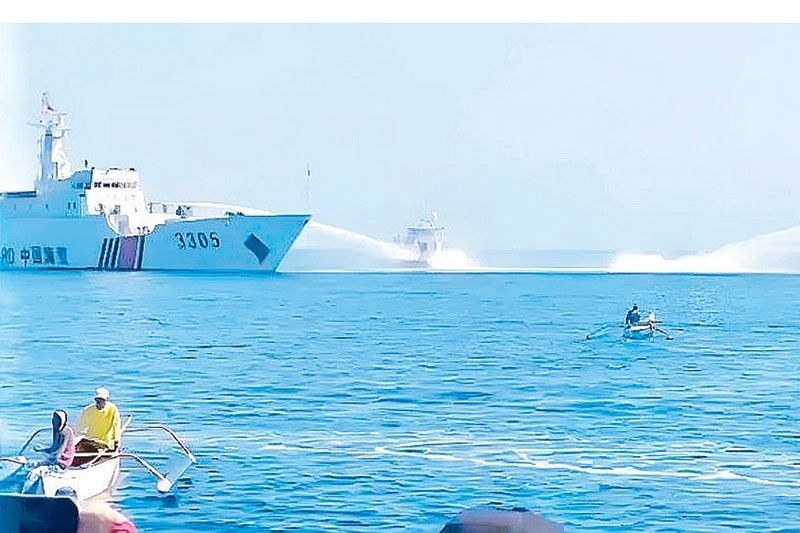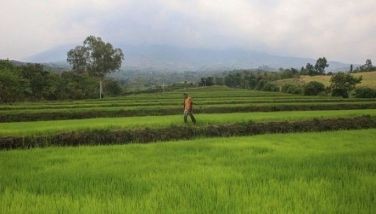Marcos Jr. pushes peace in West Philippine Sea amid tensions

TOKYO – Tensions in the South China Sea have increased in recent months, President Marcos said, as he vowed to continue striving for peace while remaining open to “new solutions” to emerging security challenges.
Marcos said efforts to resolve the maritime dispute, which he described as “the most complex geopolitical challenge that the world faces,” are still ongoing and would require the involvement of all stakeholders.
“I’m afraid we’ll have to be able to say that tensions have increased rather than
diminished for the past months or the past years… but we continue to counsel peace and continue communication between the different countries – everyone that is involved,” the President said in an interview with Japanese broadcaster NHK on Saturday.
“I cannot say that we have found the answer yet. We are still trying to formulate that answer as we speak. And things are moving very quickly in many parts of the China Sea and so there are changes in terms of approaches, (the aggravations),” he added.
Citing the conflict between Russia and Ukraine, which he called a “tragedy,” Marcos said no country in the world wants to start a new conflict, especially in Asia.
A statement by the Presidential Communications Office (PCO) quoted Marcos as saying that “a more assertive China posed a real challenge to its neighbors in Asia” that “required new solutions.”
The President gave assurance that the Philippines is always “open to the idea of finding new solutions.”
China claims historic rights over virtually the entire South China Sea, an assertion being disputed by the Philippines, Malaysia, Vietnam, Brunei and Taiwan. An arbitral court based in The Hague invalidated China’s expansive claim in the strategic waterway and affirmed the Philippines’ sovereign rights over its exclusive economic zone (EEZ) in 2016. China refused to recognize the landmark decision, claiming it is “illegal” and a “mere piece of paper.”
Tensions between the Philippines and China have simmered due to the aggressive actions of Chinese coast guard and militia vessels in the West Philippine Sea, the latest being their attacks against Manila’s resupply mission at Ayungin Shoal last Dec. 10.
According to the National Task Force-West Philippine Sea, Chinese coast guard and maritime militia vessels had “harassed, blocked and executed dangerous maneuvers” on Philippine civilian supply boats to prevent a routine resupply and rotation mission to BRP Sierra Madre, a grounded ship that serves as a Philippine Navy installation at the shoal.
Beijing’s coast guard blasted water cannons and rammed a Philippine resupply boat, actions that the task force described as “unprovoked acts of coercion.”
While its maritime claim has been invalidated, China insists that its “control measures” are in accordance with the law.
More allies needed
Marcos said the Philippines would continue to forge strong alliances with like-minded allies as it deals with the maritime row.
He cited the increasing collaboration between the Philippines and Japan, labeling it as a “very good example of evolution.”
“This alliance that we have come together with Japan is, again, to help us… work together more closely. Because in the military, since there is a tactical operation, that we really have to train with one another,” the President said.
“The so-called interoperability between the different forces… it is not sufficient actually with just Japan and the Philippines to enter into this agreement. We really must get more of these kind of arrangements in place,” he added.
The Philippines is the first recipient of the Japanese official security assistance. Manila and Tokyo have also agreed to begin talks on a reciprocal access agreement that would permit them to send military forces to each other’s territory for joint drills and training.
Marcos also cited the trilateral cooperation on defense and security capabilities among the Philippines, Japan and the US, saying there should be more of such agreements in place. According to him, countries are developing relationships in response to what they feel about the needs of the day that were not part of their policies decades before.
“I think that really is the pattern that we are seeing emerge and that is how we are evolving. And that is a very good example of evolution,” the Chief Executive said.
The US has repeatedly expressed support for the Philippines’ stance on the West Philippine Sea dispute, noting that an armed attack on Philippine armed forces, public vessels, or aircraft in the Pacific, including in the South China Sea, would invoke its commitments under the Mutual Defense Treaty of 1951.
No progress on joint exploration
Meanwhile, after more than three years of negotiations, the Philippines and China remain at a deadlock over the joint exploration of the West Philippine Sea, which President Marcos said is a problem that has to be resolved to meet Manila’s energy needs.
The President admitted that very little progress has been made with regard to the talks, which have been stalled by the maritime dispute between the two countries.
“We are still at a deadlock right now. It is in a conflict area. So, that’s another thing that we have to try and resolve to see what role any countries play,” Marcos told NHK.
“It’s still, of course, the position of the Philippines that this is not in a conflict area. This is very clearly within our EEZ… within our baselines, within the maritime territory (of) the Philippines,” he added.
In November 2018 during the state visit of Chinese President Xi Jinping in the Philippines, Manila and Beijing inked a memorandum of understanding (MOU) on joint oil and gas development in the West Philippine Sea. Under the memorandum, the negotiations for the joint oil and gas exploration will be in accordance with the principles of “mutual respect, fairness and mutual benefit, flexibility and pragmatism and consensus through equal and friendly consultation.”
The MOU and all discussions, negotiations and activities pursuant to it will be “without prejudice to the respective legal positions of both governments” and does not create rights or obligations under international or domestic law.
In 2022, then foreign affairs secretary Teodoro Locsin Jr. revealed that the negotiations on the joint exploration of oil and gas in the West Philippine Sea have been “terminated completely.”
China has expressed willingness to work with the Philippine government to resume the joint exploration talks.
Last year, Marcos said the hindrances to the joint oil and gas exploration in the West Philippine Sea have to be resolved since the Philippines needs the resources to be extracted from the area.
He admitted that the longstanding maritime row remains to be a roadblock that is hard to fix. The President had also expressed readiness to resolve the issue through means other than government-to-government channels.
“It’s a small matter to China. For us, it’s something huge. So, we need to fight for it and benefit from it if there is really oil there,” Marcos told reporters in December last year.
A statement by the PCO quoted Marcos as saying that the Philippines is working to resolve the West Philippine Sea row to start new energy exploration projects before the Malampaya gas field starts to run dry.
According to the President, the supply of liquified natural gas (LNG) is becoming more and more important to the Philippines as it transitions to renewable energy.
“We are seeing LNG as being the transition between purely fossil fuel, coal, to the bigger mix of renewables,” Marcos said.
“But this – the move to renewables, I think we are all discovering – is not as easy as we had hoped and so we need a transition period to give ourselves time to bring the infrastructure and to allow the technologies to develop,” he said.
Marcos noted that some of the new technologies are still being piloted, so the country has to wait for them to be rolled out in a commercial basis. It would take a little time for the country’s transition to clean energy, he added.
“The supply of reliable, affordable power is always going to be critical and it has been one of the problems that the Philippines has faced… power and even the lack of supply,” Marcos said.
“So, that is what we’ll be working on. That’s why LNG has become more and more important, and so it’s imperative for the Philippines to find a way to move the process forward to be able to assure ourselves of that transition – the fuel supply during that transition period,” he stated. – Alexis Romero
- Latest
- Trending






























